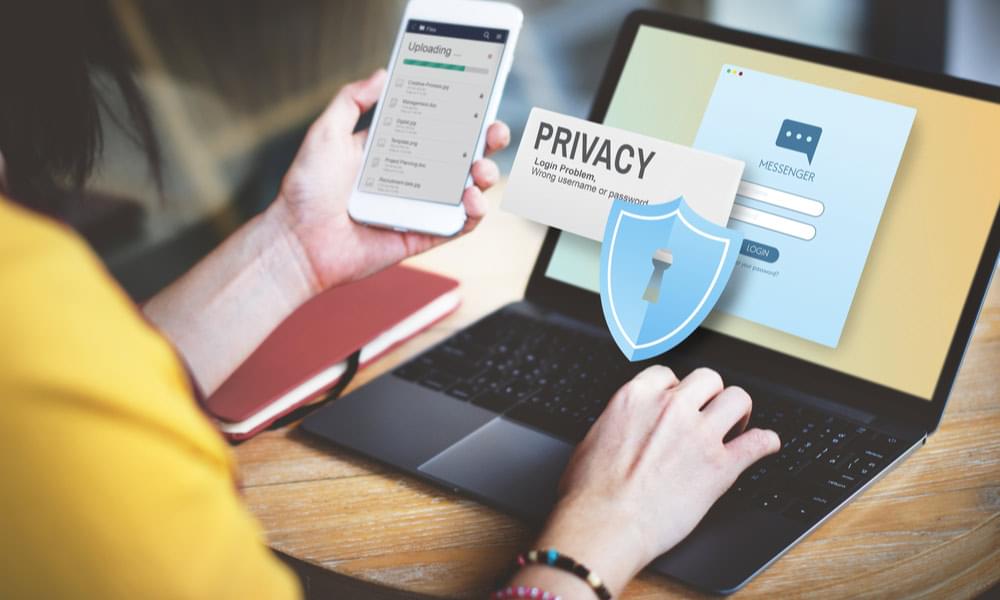How to hide search history and protect your privacy
Did you know that search engines collect and store up to 20 years of your browsing history? 🤔 Your digital footprint grows with every website visit, search query, and clicked link. This trail reveals more about you than you might realize. Your Internet Service Provider (ISP) can see all your activities and create a detailed profile of your online behavior.
The good news is that you can enjoy internet convenience without giving up your privacy thanks to several proven methods. Protect your digital privacy when you want to hide your search history from watchful eyes or stop your ISP from monitoring your activities.
Simply use browser settings and powerful tools like EonVPN to keep your online activities private and secure. Let’s dive in.
What is a digital footprint?
A digital footprint refers to the trail of data you leave behind as you use the internet. This includes everything from the websites you visit, the social media posts you make, the searches you perform, and even the emails you send. Your digital footprint can be active, like the content you post or interact with, or passive, such as data collected about you by websites and online services without you directly engaging with them.
Your digital footprint reaches way beyond what you might think. The world now has 5.16 billion internet users (about 64% of the global population), and each person leaves their own digital trail. Your online data’s protection matters more than you think.
What data gets tracked online
Websites and apps collect information about your online activities every time you go online. They use different tracking tools to gather the information:
- What you search for and your browsing history
- Your device details and settings
- Your IP address and your location
- What you like, and how you use social media
- What do you purchase and what you like
According to research, an adult will post 276 times a year on Instagram, 170 times a year on Facebook, and 141 times a year on Twitter. These posts add up to a lifetime digital footprint with almost 10,000 photos and over 10,800 social media updates.
How search engines store your history
Search engines record everything you do on the Internet. When you search for something, they save your search words and your IP address. They use a special cookie ID to track your computer even if you change connections. Google plans to make search logs anonymous after 18 months, but other search engines might keep your data forever.

The role of browser cookies and cache
Cookies and cache are two very different but crucial roles in how you use the web. A cache is where the website’s content is stored and easily loaded, while cookies remember your choices and login info.
Eighty percent of web traffic has third-party cookies that can see what you are doing on different websites. Advertisers use these tracking cookies to build up detailed profiles of how you behave online and what you like.
The numbers are rather frightening, with 57 percent of users having more than 12 pieces of personal data they expose online and 16 percent having more than 50. The exposed data includes home addresses, social media accounts, job details, and contact information.
To hide out your search history properly, you need to know these tracking tools. A VPN helps to shield your online activities by hiding your IP address and securing your internet traffic. That makes it harder for search engines and websites to put all the pieces together and actually understand what you do online.
How to hide search history
The right tools and settings will help you take charge of your online privacy. Here’s a guide to protect your digital world.
Configuring browser privacy settings
Your modern browser includes reliable privacy features you can turn on easily. Chrome protects you from malware and dangerous sites with automatic updates every six weeks. These settings will provide a strong foundation for your privacy:
- Clear browsing data automatically when closing the browser
- Block third-party cookies
- Enable “Do Not Track” requests
- Activate HTTPS-only mode
Using VPN services effectively
A Virtual Private Network (VPN) acts as your first defense against digital surveillance. A properly configured VPN encrypts your traffic data and routes it through secure servers worldwide. You can build an almost unbreakable shield around your digital activities with advanced protection like VPN.
The best VPNs should have these vital features:
- Kill switch functionality to prevent data leaks if the connection drops
- Strict no-logging policies to ensure privacy
- WireGuard or OpenVPN protocols for secure connections
- Multi-hop connections to improve anonymity
EonVPN is the best VPN for privacy, offering a strict no-log policy to provide you with a secure and worry-free platform. The best part is that it’s completely free and offers fast speeds.
Browsers extensions
Browser extensions are your first defense against tracking. Recent studies show the right mix of privacy extensions can block up to 70% of common tracking attempts. These privacy-focused extensions work best:
- uBlock origin: Blocks intrusive ads and trackers efficiently
- Privacy badger: Learns and blocks invisible trackers automatically
- Decentraleyes: Keeps you safe from tracking through CDN services
- Multi-account Containers: Stops cross-site tracking
Search engine alternatives
Google dominates with 80% of search engine usage, but privacy-focused alternatives offer similar features without tracking you. DuckDuckGo serves around 10 million private searches daily, showing you don’t need to trade quality for privacy. These search engines never store:
- Your IP address
- Search history
- User-agent information
- Personal identifiers
Note that Chrome and other browsers get security updates every six weeks. Regular updates to your privacy settings and tools will keep your defenses strong against new tracking methods.
App permissions and data access
Your smartphone apps might access more data than they need. According to research, apps can access everything from your health and financial data to up-to-the-minute location details.
Studies show that third-party apps can collect, share, and sell your information if you don’t manage permissions properly. You can protect your privacy by:
- Reviewing and managing app permissions regularly
- Removing unused apps immediately
- Limiting background app activity
- Enabling permissions only while using apps
- Using approximate location when that’s enough
Your device can automatically remove permissions for unused apps to boost protection. This feature stops dormant apps from collecting data in the background.
Mobile browser privacy
Mobile browsers need extra attention because they can expose much of your personal information. By default, Safari turns on its Intelligent Tracking Prevention tool, and Chrome has a variety of safety features to keep you safe from malware and bad websites.
Your mobile browser privacy becomes stronger when you:
- Enable secure DNS lookup for encrypted information transfer
- Activate enhanced protection mode
- Configure privacy-focused search settings
- Block third-party cookies
- Clear browsing data regularly

Location history settings
Location tracking raises serious concerns on mobile devices. Your precise device location gets saved regularly to both your devices and company servers when enabled. Here’s how to protect your location privacy.
Immediate Actions: Your device tracks your whereabouts even when you’re not using specific apps. Android 11 users can set granular permissions to “Allow only while using the app,” which greatly cuts down on background tracking.
Note that some apps need location access to work properly, but approximate location data often works instead of precise coordinates. This balance helps maintain your digital security without losing convenience.
Tor browser benefits and limitations
The Tor browser gives you extra privacy through its unique onion routing system. It runs on secure, encrypted networks and masks your IP address and browsing history well. It offers these factors:
- Speed considerations: Tor connections run slower than regular browsing due to multiple relay points
- Limited website access: Some websites don’t work properly on Tor
- ISP visibility: Your ISP can still detect Tor usage even though your activities stay encrypted
- Exit node vulnerability: The final relay point lacks encryption, which creates a weak spot
Private DNS services
Domain Name System (DNS) privacy often gets overlooked but plays a vital role in complete protection. Private DNS services encrypt your DNS queries so ISPs can’t monitor your website visits. Modern DNS protection gives you:
Enhanced security features: Private DNS blocks malicious domains automatically while keeping your queries encrypted. A combination of private DNS and VPNs adds an extra layer of protection that keeps your domain lookups confidential.
Implementation benefits: Private DNS works with other privacy tools to create multiple protection layers. This setup encrypts your browsing data and DNS requests, making it harder for anyone to track what you do online.
These tools work best together. Your VPN handles simple encryption needs, Tor adds anonymous routing and private DNS keeps your website lookups confidential. This combination gives you the strongest online privacy protection.
Regular privacy audits
Regular privacy audits let you control your digital footprint better. Studies show that searching yourself online in incognito mode gives you the most neutral results of what others see. Your privacy audit should:
- Search your full name in quotation marks
- Look through different search engines
- Check image search results
- Search past and current email addresses
- Look up social media usernames
- Set up Google alerts for your name
Data broker opt-outs
Data brokers collect and sell your personal information to third parties. They collect everything about you, from your name, your date of birth, your address, your Social Security number, basically everything about you. However, removing your information from data broker sites is a very important step in protecting your privacy, and it takes time.
The opt-out process works like this:
- Find data broker websites with your information
- Verify your identity through email
- Submit removal requests
- Check if removal is complete
- Repeat this process every few months
Important: Some organizations might keep your data in anonymous form after your opt-out request. Hiding your online activities can help stop new data collection.
Social media privacy
Social media platforms now give you better privacy controls, but their default settings leave you exposed. Research shows that the average adult shares hundreds of posts every year on platforms of all sizes. This creates a huge digital footprint.
Your privacy settings should cover the following:
- Who sees your personal information
- Who can view your posts
- Photo tagging permissions
- Location sharing options
- When others see you online
Note that social media quizzes and games often collect data for hackers. You should be extra careful when sharing sensitive information that could answer security questions for other accounts, like your high school name or maiden name.

These strategies create a strong defense against identity theft and unauthorized data collection when you review them regularly. A VPN adds more protection by encrypting what you do online and stopping others from tracking your digital footprint.
Conclusion
Modern digital life demands multiple layers of privacy protection. Your online activities leave digital traces that reveal personal details to search engines and data brokers.
The right combination of tools and knowledge can reduce your online exposure by a lot. Your first defense starts with browser privacy settings, secure search engines, and proper app permissions. VPNs and private DNS services add vital security layers that protect your browsing habits.
Regular checks on privacy, smart use of social media, and opting out of data broker services mean you retain control of your digital identity. Keep in mind that your privacy isn’t something you do once, your security is based upon regular monitoring as tracking technologies evolve.
These privacy protection strategies will be very useful in creating a strong shield around your digital presence and preventing anyone from accessing your personal information without your knowledge.
FAQs
How can I prevent my Internet Service Provider (ISP) from seeing my browsing history?
A Virtual Private Network (VPN) is one of the best ways to hide your browsing history from your ISP. A VPN encrypts your internet traffic and routes it through a server in another location, making it difficult for your ISP to see your online activities.
Are there any browser settings that can enhance my online privacy?
Yes, there are several browser settings you can adjust to improve privacy. These include enabling “Do Not Track” requests, blocking third-party cookies, and activating HTTPS-only mode. Additionally, by utilizing privacy-focused browsers like Tor or Brave, you’ll add some extra layers of protection.
How effective is incognito or private browsing mode in protecting my privacy?
Private browsing mode or incognito lets you browse without your local history being saved, cookies, or search records being saved. But it doesn’t cover your tracks from your ISP or the websites you visit. This will not give you full online anonymity, but it’s useful for privacy on shared devices.
What are some alternatives to popular search engines that prioritize privacy?
Privacy-focused search engines like DuckDuckGo, Startpage, or Qwant are good alternatives. These search engines don’t track your searches or build a profile of your online behavior, offering a more private search experience compared to mainstream options.
How can I manage my digital identity and reduce my online footprint?
To manage your digital identity, regularly conduct privacy audits by searching for your name and personal information online. Remove yourself from data broker sites, adjust your social media privacy settings and be careful what you share online. Using a VPN and being mindful of your digital activities can also help reduce your online footprint.

